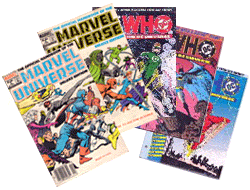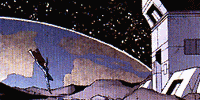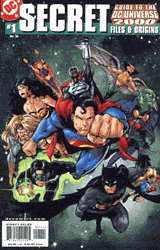| | operative network | writing archive: columns - reviews - interviews - features
 One of my most prized possessions is a large stack of comic books very different from the rest. These comics have no storylines, feature literally scores of creators collaborating on different pages and more characters than any big crossovers you could imagine. No, it's not Secret Wars or Maximum Security or even Our Worlds At War—it's a stack of Who's Who in the DC Universe and Official Handbook of the Marvel Universe (with some Dark Horse Star Wars handbooks thrown in for kicks).
One of my most prized possessions is a large stack of comic books very different from the rest. These comics have no storylines, feature literally scores of creators collaborating on different pages and more characters than any big crossovers you could imagine. No, it's not Secret Wars or Maximum Security or even Our Worlds At War—it's a stack of Who's Who in the DC Universe and Official Handbook of the Marvel Universe (with some Dark Horse Star Wars handbooks thrown in for kicks).
Before I ever got the idea to deal with comic books professionally, prior to any of my ideas of translating the madness swirling around inside my skull into words you can see or hear, I devoured these books. I bought as many as I could get my hands on, studied them incessantly, memorizing everything from Jim Corrigan's early life and to the difference between different iterations of Iron Man's armor. And best of all, I was exposed to new characters that piqued my interest like Per Degaton (who led me to All Star Squadron) and Flag Smasher (who led me to read the only Captain America issues I can remember paying for).
Armed with whatever bits of minutiae I'd just read, I'd trot off to the comic book store (years before I learned what day new comics came in—there was always something new to me when I went to the store, which was good enough) and strike up a conversation with the staff and any suckers, er, patrons standing around at the time. I remember a comic book store on either Harbor or Katella in Anaheim, California, where I spent hours discussing why the Spectre (at the time) was the most powerful hero there was (the owner dug up a book where, with a single finger, the Spectre held back pre-Crisis, pre-Zero Hour, juggles-planets-like-oranges Superman, eliciting oohs from three pre-teens and the mid-twenties clerk present). I'd often pick up titles I'd never heard of because they were mentioned in these compendiums, bolstering my own pull lists and making the store owners very happy.
The benefits of these books to shy, slightly sociopathic youngsters notwithstanding, I would like to impress upon the reader the importance of centralized information resources. Today, in 2001, I would like to see Marvel and DC recreate their grand databases of character information and publish them on CD-ROM, with online updates. More on that in a bit, though.
 In one Superman comic I read recently, (Adventures of Superman #594, for your info) Big Blue is out fighting Imperiex drones and their simulacra in space. Now, many of you may remember that Superman can't breathe in space. I have JLA issues not three years old showing him in space using a breathing apparatus. You'll see none of that now. In one issue (one I don't remember as clearly), I even believe he was talking in space.
In one Superman comic I read recently, (Adventures of Superman #594, for your info) Big Blue is out fighting Imperiex drones and their simulacra in space. Now, many of you may remember that Superman can't breathe in space. I have JLA issues not three years old showing him in space using a breathing apparatus. You'll see none of that now. In one issue (one I don't remember as clearly), I even believe he was talking in space.
Now, things may have changed while I wasn't looking, but this isn't the place to discuss my personal boredom with the Last Son of Krypton, so for the moment, let's assume they haven't and instead discuss how a compendium such as Who's Who in the DC Universe could have cleared this up. As of now, writers and editors discuss stories, and editors are charged with catching minor flubs in what we still laughingly refer to as continuity. It should be no surprise they often miss things. Lots of things. They're busy, they're overworked, they're in fear for their jobs (Bobbie Chase, we barely knew thee...). So Superman getting punched around by a pan-galactic conqueror and not being breathless can slip by.
On the other hand, in a world with a current Who's Who directory, complete with online PDF downloads of the most current data, the writer (or the artist, perhaps) could have simply consulted his copy and said, "Oh, silly me, Superman can't breathe in space!" Breathing apparatus drawn in, continuity is safe for another day.
Let's look at another case: Nick Fury ostensibly appeared in Wolverine and Marvel Knights recently. Captain America has Fury returning to run S.H.I.E.L.D. (which has gone by, alternatively, the Strategic Hazard Intervention Espionage and Logistics Directorate and Supreme Headquarters International Espionage & Law enforcement Division, depending where you look), while it's mentioned nowhere else.
A simple hop to OHOTMU.COM (if it existed, to my knowledge it does not) could produce a 100% current look at the colonel (and also show which version of S.H.I.E.L.D. we're using this week), whether or not he's running the whole show, when he started and what he's up to. Everything cleared up, and maybe Dum Dum Dugan or Alexander Pierce could appear in Fury's place, if he's actually somewhere else. Let's ignore the robotic end for the Fury in Marvel Knights.
A centralized repository of information allows glorious control of data—much like Orwell's Ministry of Truth spent days revising the history of a nation to say "We're at war with Eastasian, we've always been at war with Eastasia," a simple File Transfer Protocol command could do the same in our own brave new world. Likewise, comic book store arguments could be solved by anyone with a mobile broadband connection (like the one those bastards at Earthlink are supposed to be delivering...).  Finally, writers and artists could have a more responsive informational source than harried editors, constantly being hounded by overbearing corporate overlords and sometimes unable to give the work its full attention. Finally, writers and artists could have a more responsive informational source than harried editors, constantly being hounded by overbearing corporate overlords and sometimes unable to give the work its full attention.
DC is hobbling through its information in the Secret Files & Origins project, which ties vignettes with character dossiers. Marvel has a hard enough time keeping things working while they blow up half of Manhattan every month in at least one title or another (why anybody lives in Marvel's Manhattan is a mystery, the place is crawling with masks), so they just gave up the ghost. Some people would point out Marvel's failed initiative at putting archive material on CD-ROMs in the early '90s, to whom I'd point out: 1) Marvel was too early on a technological field that hadn't even seen Myst or Quake yet, 2) Marvel gave the project little promotional support (I discovered it years after it had passed from popular commerce) and 3) it was certainly not marketed to the burgeoning future dot-com crowd, who'd have loved to have entire pages of Marvel's glory days as their wallpaper as they surged through venture capital.
The price to produce such a product in today's industry should be favorable: How many Marvel zombies and old-school DC fans have writing experience and can come in to do a page on a character, not to mention the likes of Busiek or Priest, who could leave indelible marks on whatever characters they could get their hands on (until the next update at least). Using archival art would actually serve better than the specialized drawings used in prior editions of Who's Who (OHOTMU's loose-leaf versions were much better artist references, showing characters from front, back and side) and could cut costs. The project could be publicized online with a virtually built-in audience.
Current online resources could also be culled, including some of this writer's favorite resources:
 There's a lot more in my own personal bookmarks, but a Google search and some motivation should help you a lot. As good as these sites are, an official company line would be all the more fascinating and, presumably, profitable. There's a lot more in my own personal bookmarks, but a Google search and some motivation should help you a lot. As good as these sites are, an official company line would be all the more fascinating and, presumably, profitable.
So, to sum up: 1) Everybody can be on the same page, which is good for continuity and good for fans, 2) the industry is in a perfect place technologically and marketing-wise to do this, 3) if Quesada and Jemas' magic act has any truth, the industry is perfectly primed to teach the world about the art form's data and a glossary would help even more people get into it and 4) it'd be really cool.
Besides, a stack of CDs is endlessly easier to care for than a stack of comic
books, and a lot easier to show off.
Hannibal Tabu, the operative, is the first born son of a pusherman. He lives with his wife in south Los Angeles, broadcasts his bile at the world from his virtual clocktower at www.operative.net. While amazed at the praise he has received for his work, he is endlessly thankful.
|

 One of my most prized possessions is a large stack of comic books very different from the rest. These comics have no storylines, feature literally scores of creators collaborating on different pages and more characters than any big crossovers you could imagine. No, it's not Secret Wars or Maximum Security or even Our Worlds At War—it's a stack of Who's Who in the DC Universe and Official Handbook of the Marvel Universe (with some Dark Horse Star Wars handbooks thrown in for kicks).
One of my most prized possessions is a large stack of comic books very different from the rest. These comics have no storylines, feature literally scores of creators collaborating on different pages and more characters than any big crossovers you could imagine. No, it's not Secret Wars or Maximum Security or even Our Worlds At War—it's a stack of Who's Who in the DC Universe and Official Handbook of the Marvel Universe (with some Dark Horse Star Wars handbooks thrown in for kicks).
 In one Superman comic I read recently, (Adventures of Superman #594, for your info) Big Blue is out fighting Imperiex drones and their simulacra in space. Now, many of you may remember that Superman can't breathe in space. I have JLA issues not three years old showing him in space using a breathing apparatus. You'll see none of that now. In one issue (one I don't remember as clearly), I even believe he was talking in space.
In one Superman comic I read recently, (Adventures of Superman #594, for your info) Big Blue is out fighting Imperiex drones and their simulacra in space. Now, many of you may remember that Superman can't breathe in space. I have JLA issues not three years old showing him in space using a breathing apparatus. You'll see none of that now. In one issue (one I don't remember as clearly), I even believe he was talking in space.
 Finally, writers and artists could have a more responsive informational source than harried editors, constantly being hounded by overbearing corporate overlords and sometimes unable to give the work its full attention.
Finally, writers and artists could have a more responsive informational source than harried editors, constantly being hounded by overbearing corporate overlords and sometimes unable to give the work its full attention.  There's a lot more in my own personal bookmarks, but a Google search and some motivation should help you a lot. As good as these sites are, an official company line would be all the more fascinating and, presumably, profitable.
There's a lot more in my own personal bookmarks, but a Google search and some motivation should help you a lot. As good as these sites are, an official company line would be all the more fascinating and, presumably, profitable.